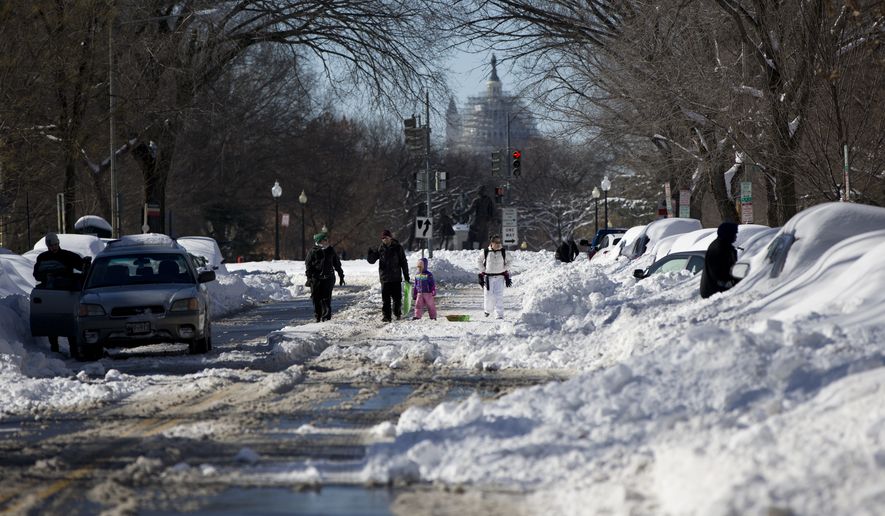The District faces a preliminary $55.3 million snow removal tab from last month’s blizzard, but the federal government, which declared a state of emergency for the storm, likely will cover some of those costs, city officials said Thursday.
Chris Geldart, director of the D.C. Homeland Security and Emergency Management Agency, told The Washington Times that a final estimate has not been tallied. The District allocated about $6.2 million for snow removal this year, and the city’s emergency coffers would cover any cost overruns.
In a Transportation Committee hearing Thursday, D.C. Council member Mary M. Cheh, Ward 3 Democrat, took Mayor Muriel Bowser to task for not collecting fines from residents who failed to shovel their sidewalks or move their cars during the snowstorm. She said revenue could have been used to defray cleanup costs.
“The mayor decided not to enforce the law for this storm,” Ms. Cheh said at a hearing on the city’s response to the storm. “To completely forgo it, I think, was a mistake.”
During the blizzard, Ms. Bowser said she would not enforce part of a new law that levies $25 fines on property owners who do not clear their walkways within the first eight daylight hours after snowfall stops. The storm dumped up to 2 feet of snow in the area and marked the first time the law could have been applied.
The mayor also announced that she would void hundreds of tickets for those who parked on emergency routes on Jan. 22 — the day the storm started.
It’s tough to predict how much money the city would have made from fining residents who failed to shovel their sidewalks because no tally was taken, but the parking tickets alone would have netted $700,000.
“There was plenty of warning. It was well-communicated. Drivers had at least 24 hours’ notice,” said Ms. Cheh, who chairs the Transportation Committee. “That’s lost revenue. We could have used the money to offset costs of storm cleanup.”
Ms. Cheh said she fought for years to get the sidewalk provision enacted, and it was made law last year.
“This was the first real opportunity that this could have been put into place,” she said.
Mr. Geldart defended Ms. Bowser’s decision to forgo tickets for snowy sidewalks.
“This wasn’t a 6-inch snowstorm. This was 26 inches of snow,” he said. “We decided to let the people do the right thing.”
D.C. Department of Public Works Director Christopher Shorter said his agency has been using this season to educate residents about the snow removal law rather than ticketing unaware people.
Residents and businesses that didn’t clear snow made it difficult for people to navigate the narrow sidewalks of Georgetown, said Will Handsfield, who lives in the neighborhood.
“Not a single fine was collected, even for the most egregious scofflaws,” Mr. Handsfield told the committee.
Though council members and residents praised much of the city’s response to the storm, some said drivers’ needs took priority over the needs of pedestrians. Mr. Handsfield said Ms. Bowser should have called for drivers rather than pedestrians to stay off the streets after the storm.
“I was a little disheartened that the message from the mayor was [for pedestrians] to get out of the streets,” he said.
Several residents testified that sidewalks weren’t cleared for days after the storm and that enforcing the law may have encouraged snow shoveling sooner. As roads were cleared while sidewalks were blocked, some residents who don’t have cars felt slighted.
“Pedestrians don’t count for very much in terms of our city’s transportation priorities,” said Joe Reihner, who spoke on behalf of All Walks D.C., a pedestrian advocacy group. “We are part of a different transportation sector, which, I’m sad to say, didn’t do too well in the storm.”
Mr. Shorter acknowledged that roads were the first priority when the city was removing the 4.5 million cubic feet of snow.
Mark Eckenwiler, a Ward 6 Advisory Neighborhood Commission member, questioned why a law was enacted if no one planned to enforce it. He chided Ms. Bowser for giving residents a break because of the size of the storm.
“If there is ever a time when you need the law enforced, it’s when you have a significant snowfall,” he said.
Lack of enforcement will give residents the idea that they can ignore the law during the next snowfall, Ms. Cheh said.
“It signals to residents that these safety laws are arbitrary,” she said.
• Ryan M. McDermott can be reached at rmcdermott@washingtontimes.com.




Please read our comment policy before commenting.